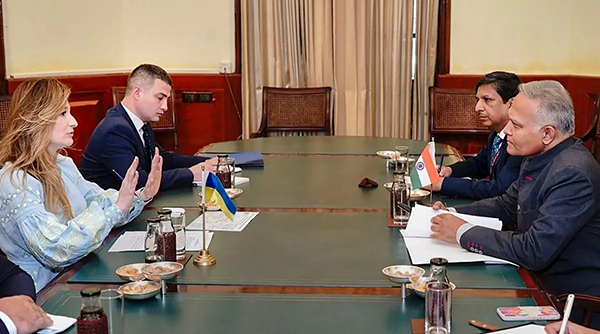
Ukraine seeks enhanced engagement with India, including a resolution to the war with Russia. Ukrainian First Deputy Foreign Minister Emine Dzhaparova delivered a letter from President Volodymyr Zelensky seeking a phone conversation with Prime Minister Narendra Modi and inviting him to visit Ukraine. The Ukrainian leadership wants to coordinate with India on security issues and hopes for greater Indian involvement in efforts to end the war. Dzhaparova also raised the possibility of Ukraine’s speaker, Ruslan Stefanchuk, joining a parliament-level event to be hosted by India.
Ukraine is keen to enhance engagement with India, especially at the level of the Prime Minister and national security adviser, to find a resolution to the war triggered by Russia’s invasion, Ukrainian first deputy foreign minister Emine Dzhaparova said on 10 April.
Dzhaparova, who held talks on 10 April, with secretary (West) Sanjay Verma of the external affairs ministry, delivered to the Indian side a letter from President Volodymyr Zelensky seeking a phone conversation with Prime Minister Narendra Modi and inviting him to visit Ukraine.
“I brought a letter signed by my president, we requested a phone conversation between our leaders. We invite Prime Minister [Modi] to pay a visit to Kyiv. We invite National Security Advisor, Mr [Ajit] Doval, to pay a visit to Kyiv and to talk to his counterpart Mr Andriy Yermak,” she said in an interview.
The Ukrainian leadership wants Yermak and Doval to “coordinate our bilateral track, especially on security issues”.
Pointing to the Indian G20 presidency’s motto of “One Earth, One Family, One Future”, Dzhaparova said this is “absolutely the correct thing because everything is inter-connected and this is why we believe India should play a greater role”.
Dzhaparova, who considers Sathya Sai Baba her spiritual guru and is the first Ukrainian leader to visit Delhi since the start of the war, said: “We call India vishwaguru. That’s something that also puts us on a common path because we promote values…My visit here is with one clear goal – to make our dialogue more intensified.”
In a reference to India’s long-standing security and strategic relations with Russia, Dzhaparova said Ukraine is “not in the position of lecturing how India should do this or that. It’s your domestic issue and we respect your domestic decisions, be it economy or military contracts or any other thing.”
However, Dzhaparova referred to the “turbulent” geopolitical situation in India’s neighbourhood and said it will be pragmatic for India to “diversify options with [regard to] military supplies and energy supplies, to be more pragmatic on the bilateral track, for example, with Ukraine”.
She added, “For example, National Security Adviser Doval has [visited] Moscow three times. So we think that in order to balance that, he might also come to Kyiv. This is what we call a pragmatic approach, because while there is a conversation with one side, there should be a conversation with another side.”
Ukraine envisages a “bigger engagement and greater involvement” for India in efforts to end the war, though all negotiations should be based on Zelensky’s 10-point peace plan, she said. During her meetings, Dzhaparova also sought equipment, technology and expertise from India for demining operations in Ukraine and raised the participation of Indian companies in the rebuilding of her country.
In the context of India’s G20 presidency, Dzhaparova said Ukraine believes it “would be important to engage Ukrainian officials in the meetings of G20 [and] the September summit…President Zelensky might be invited and we actually consider and expect the invitation, probably online”. She also raised the possibility of Ukraine’s speaker, Ruslan Stefanchuk, joining a parliament-level event to be hosted by India.
Responding to a question on Indian officials saying that the guest countries for this year’s G20 have been finalised and there are no plans to involve other nations, Dzhaparova said the situation is dynamic and there could be changes.
“Nobody thought Ukraine would resist that long a year ago. A year ago, we didn’t think we would have Patriot systems, Abrams tanks or HIMARS systems in Ukraine…This is why I’m here, to…deliver the message that comes from Ukraine, to explain to the Indian people what is the reality on the ground, to explain that it’s about everyone,” she said.
India has refrained from publicly criticising Russia’s invasion of Ukraine and it has not voted in favour of any resolution at UN bodies denouncing the aggression. The Indian side has consistently called for an end to hostilities and a return to dialogue, with Modi telling Putin last year that “today’s era is not of war”. At the multilateral level, differences between G7 states and Russia on text to describe the Ukraine war have held up consensus at key G20 meetings hosted by India.

















